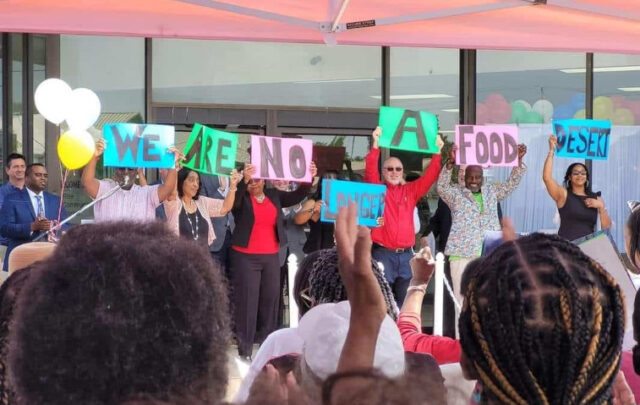Abalimi Bezekhaya is an organization focused on using urban agriculture to develop and improve food insecure communities in and around Cape Town, South Africa. Operating for more than 30 years, the organization has helped dozens of communities improve their health and lifestyles.
Abalimi means “the planters” in Xhosa, which is the predominant language of the communities in which the organization works. They help both individuals and groups create and maintain organic growing and conservation projects to promote sustainable lifestyles, create jobs, and reduce poverty. Food Tank had the chance to speak with Suren Sewchuran, Interim Chief Executive Officer at Abalimi Bezekhaya, about the challenges and lessons learned while improving food security in South Africa through urban agriculture.
Food Tank (FT): What was the inspiration to start Abalimi Bezekhaya?
Suren Sewchuran (SS): That’s easy! Food Security. No matter how poor someone might be, they don’t need to be hungry. This motivation keeps our team of old and young moving, even today as well (Abalimi has been operating for 35 years). With soaring food prices, the Cape Town wind, combined with regular low amounts of rain, and nutrition being just as important and necessary now as ever, we hope to reach a wider audience among South Africans to build a more food secure country on a local and national level.
FT: Who are the individuals, groups, and community-based organizations you strive to help through your organization, why have you chosen to target these groups?
SS: Abalimi aims to serve a few groups using the same means—urban agriculture. Through this tool, we help gardeners of all levels grow their own food at home, in urban and community gardens, as well as small-scale farmers on small plots or with farms of their own, or shared holding.
FT: How does Abalimi Bezekhaya support and uphold the traditions of those target communities?
SS: Abalimi Bezekhaya is primarily subsidized by private funders and organizations who are also passionate about food security and income security, which are some of Abalimi’s objectives. These people and organizations partner with our outreach team to provide the research and funding we need to expand our services, keep up with the community dynamics and needs, as well as meet long-term goals of changing the urban landscape into a greener and food secure environment.
FT: What are the greatest challenges to starting an Urban Agriculture, Environmental Action Model project in Cape Town and the Cape Flats?
SS: We find that the challenges are both financial and varied based on personal bias. Each community has a diverse background of politics, struggles, and cultural identity. We try to marry this with our tactics on urban agriculture, training, and building soil infrastructure. Generally, the garden serves as a common denominator for this marriage. Each year, we subsidize the cost of entry for urban farmers into Abalimi with soil, compost, seed, seedlings, and other more tangible needs. Following that, we keep these growers updated with training, problem solving, and the inevitable pest or larger pest—theft. We need help with being everywhere all the time. Our team requires transport to visit the gardens, finance to assist the gardeners with growing inputs, tools, and support to respond to all the requests for help.
FT: How have your urban agriculture projects improved the livelihoods of the communities you work in? Can you provide specific examples?
SS: Our team continues to be motivated because of the countless examples of urban agriculture being the change to the individual as well as their community. We see old and young revived with energy from eating healthy food, as well as the therapeutic effects of working with the earth. Lives are changed when they have access to their own garden and free up some of their disposable income from other sources for school fees, airtime, or transport.
A few of our farmers are in their eighties. They are pictures of good health every day going to their gardens (home or community based) to water, weed, and tend to plants. They eat their vegetables, have a sense of community, and share their knowledge as well as food. We’ve never met a depressed farmer…unless, of course, a mole has stolen a potato intended for dinner!
FT: What is the difference between your Urban Agriculture Program and your Greening Program?
SS: Our greening program runs alongside our agriculture. With food being our focus, greening often comes second. We try and encourage wind breaks for water conservation, plants (like chillies) to attract pollinators as well as preserve the local landscape that our gardens sculpt. This year, we are focussing on growing our vegetables from organic seeds and will have dedicated plots for indigenous varieties of vegetables. We have seen how our community gardens can turn a sand dune into an urban oasis that feeds a family and extended family. We often partner with similar organizations for farming inputs for our community gardens, and draw on best practices from them as well.
FT: Finally, are there any new projects or partnerships pending for the future of the organization?
SS: We have a few big goals in mind for the near future. We would like to continue to grow our new Young Farmer Training Centre by getting youth interested in urban farming as a career option. Abalimi is also looking at expanding our research with visits from all over the world. We are also keen on improving our computer infrastructure so that our monitoring and evaluation tools are easier to work with. With this in mind, we are hoping to expand the services offered at our Garden Centres located in the heart of Nyanga and Khayletisha.





